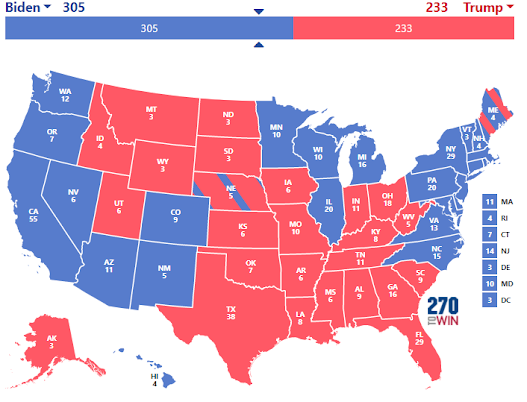While former Vice President Joe Biden holds a solid lead in nationwide polling and more moderate but consistent leads in several crucial battleground states, few observers are completely counting out President Donald Trump's ability to pull off a win in tomorrow's election, remembering his victory in 2016 that flew in the face of battleground state polling.
This how we see the state of the race currently:
In this scenario Biden is favored to sweep the upper Great Lakes region, retaking Wisconsin and Michigan that Trump won in 2016 and maintaining Minnesota in the Democratic column. In addition to Minnesota, Biden seems in a strong position to win all the other states Hillary Clinton won in 2016, with New Hampshire and Nevada the other two Trump may have a decent chance to peel off, but likely only if he already has enough electoral votes from other battleground states.
Trump meanwhile has to content with the increasing competitiveness of traditionally solid Republican states of (in order of decreasing chance of a Democratic win) Arizona, Georgia, and Texas.
Of course, the traditional battlegrounds of Florida, Ohio, and Iowa remain a tossup for either candidate, with Trump having a clearer polling advantage in the latter two than in Florida. However, Trump's polling strength among Hispanics in Florida along with the relatively strong Republican performance in the state in the 2018 midterm election could point to the ability to keep the state red.
North Carolina, a traditionally Republican state, has continued to poll with essentially no advantage to either candidate, though its competitive Senate race has seen an advantage for the Democrat over the incumbent Republican. Pennsylvania, considered a battleground but also a consistent Democratic state except for 2016, has given Biden a slightly stronger lead, but still can be won by Trump.
Nebraska and Maine, which split their electoral votes by congressional district and at-large winner, may both have split votes this election, the first time both states have split their votes in the same election. Nebraska's 2nd Congressional District, home of Omaha and portions of suburban Sarpy County, is tilting toward Biden in polling. Maine's 2nd Congressional District is a tossup, with perhaps a slight lean toward Trump. Trump won both last year.
If we had to choose who will in each state/congressional district:
Agree? Disagree? Let us know your thoughts in the comments!
Images from 270towin.com


